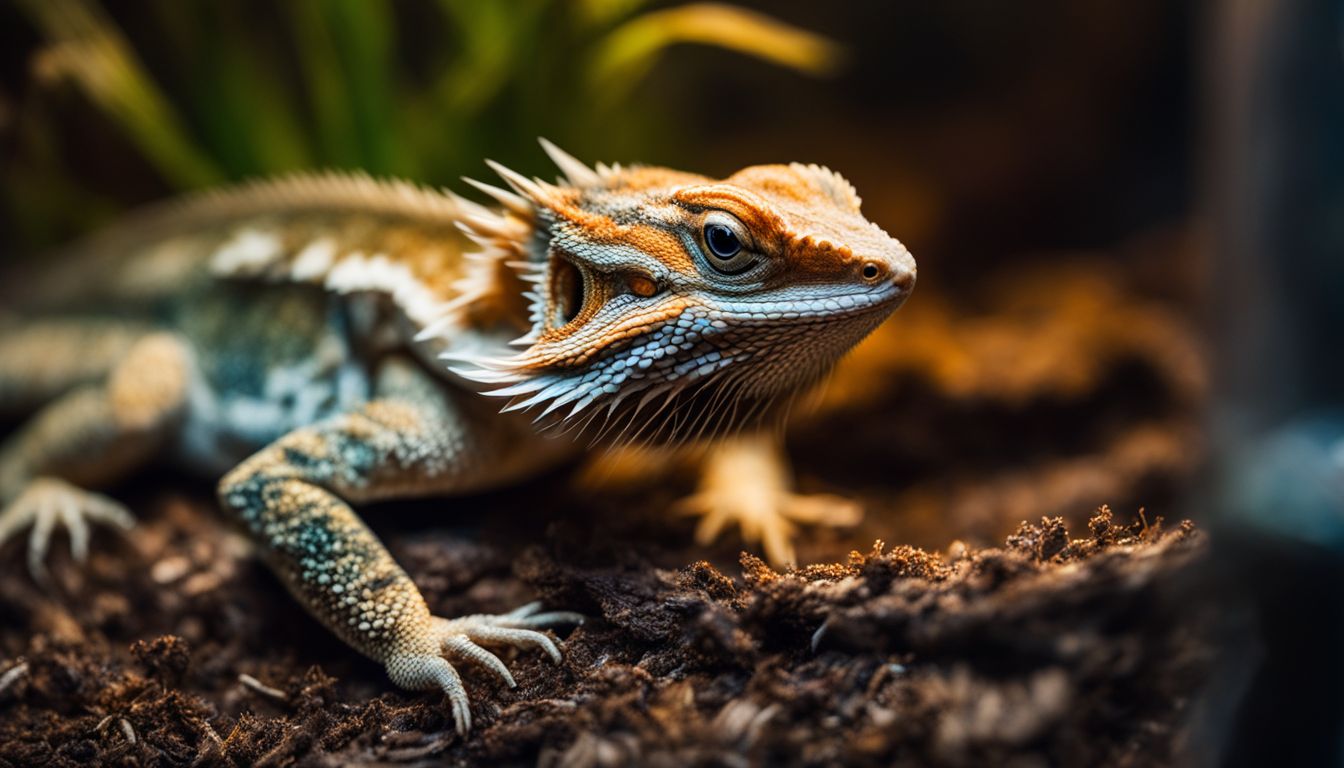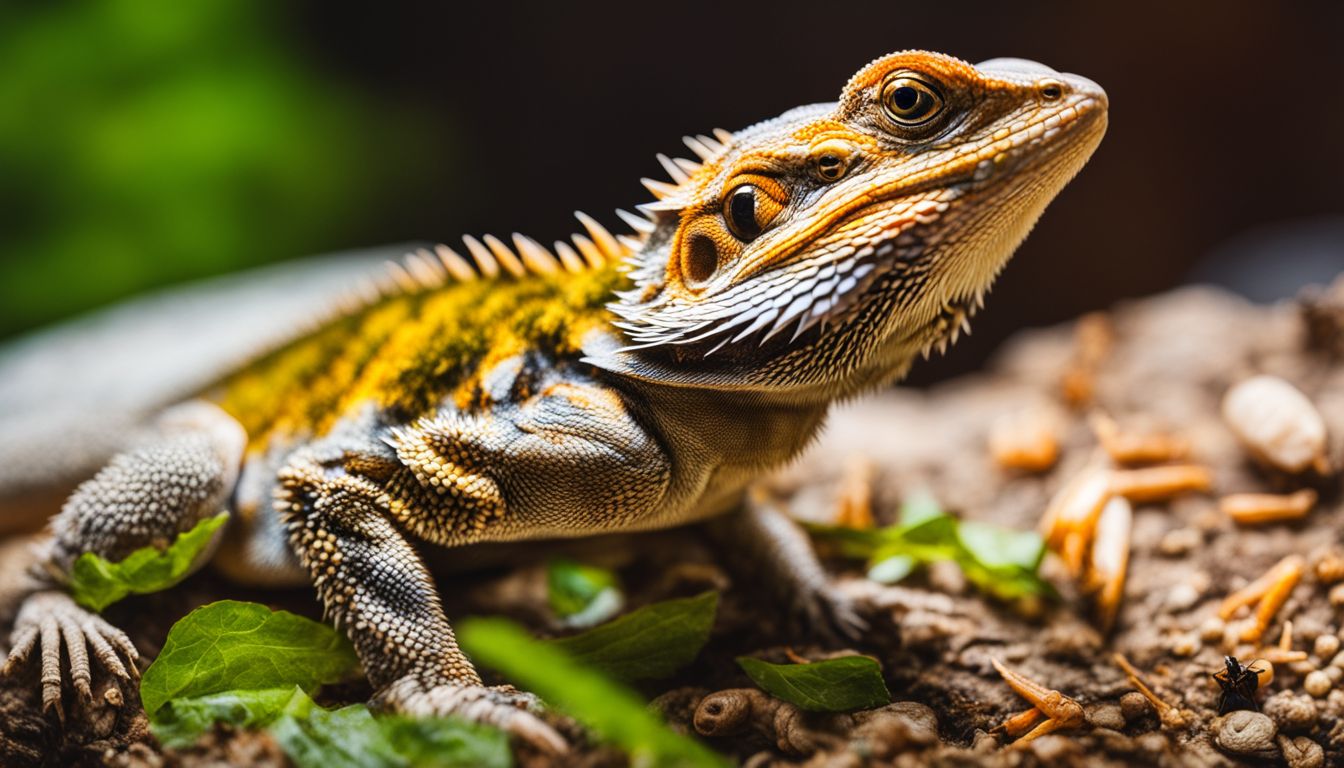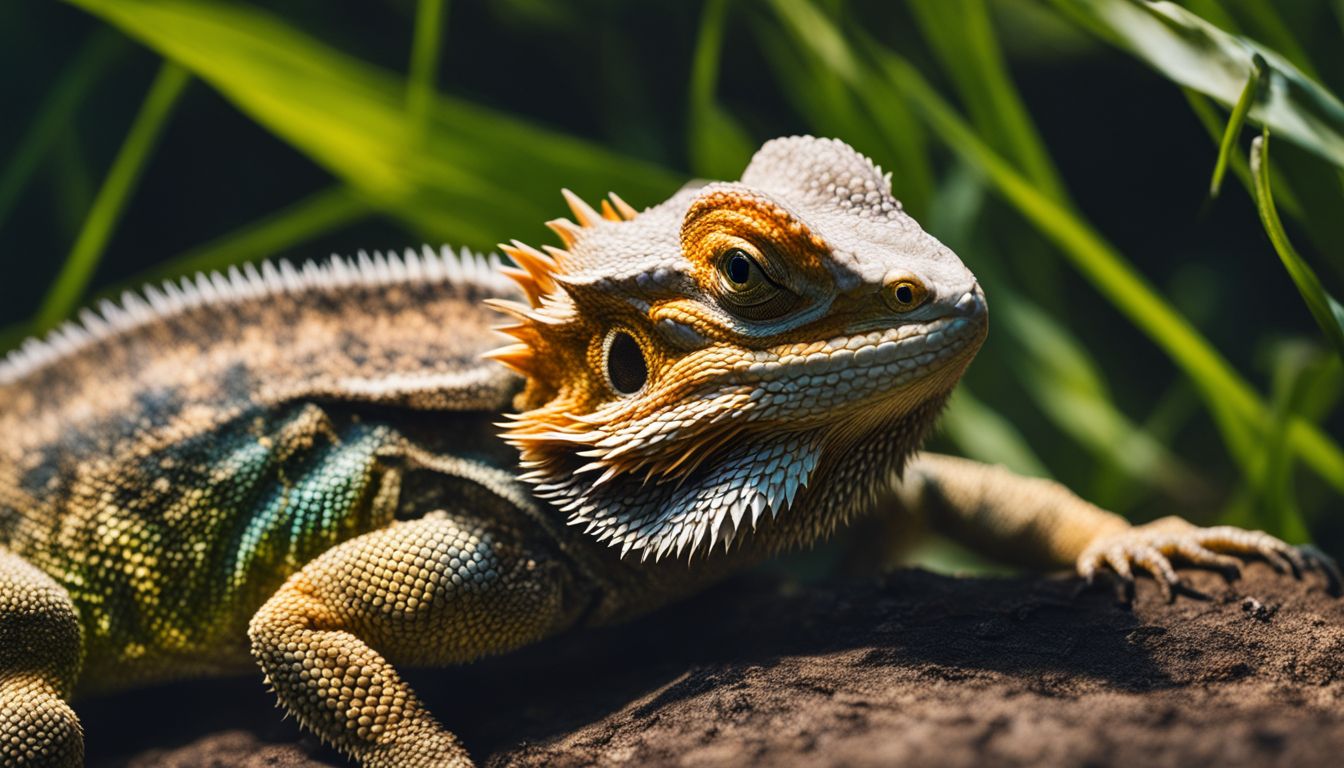Finding the perfect snack for your bearded dragon can sometimes feel like a puzzle. One often-asked question is, “Can bearded dragons eat darkling beetles?” Well, darkling beetles are high in protein—a fact that might make them seem like an ideal treat.
This article will guide you through understanding if these beetles are a safe and nutritious option for your pet. Read on to discover what we’ve found!
Understanding Darkling Beetles

Darkling beetles offer a high protein snack for your exotic pets, including bearded dragons. These insects are quite common in reptile diets due to their nutritional value. However, they come with a catch – they’re not nutrient-dense enough to be the main part of the diet.
Their feeding habits make them easy to breed and offer as feeder insects. This makes them an appealing option for pet owners looking for feed supplementation.
Despite their benefits, darkling beetles lack essential nutrients that bearded dragons need for optimal health. The limited nutritional information available about these insects suggests they should only serve as occasional treats.
They can help prevent nutrient deficiency when mixed with other dietary requirements but relying solely on them could leave your pet lacking in vital nutrition.
Can Bearded Dragons Eat Darkling Beetles?

Yes, bearded dragons can eat darkling beetles. They are safe for adult bearded dragons but should be limited for baby bearded dragons due to their hard exoskeleton.
https://www.youtube.com/watch?v=unUOGC8k9xs
Adult Bearded Dragons and Darkling Beetles
Adult bearded dragons can safely enjoy darkling beetles as a part of their diet. These reptiles have the capability to handle the beetles’ tough outer shells, thanks to their strong digestive system.
Feeding these insects should not happen too often—make it a treat once every other week. This ensures your pet maintains a nutritional balance without risking dietary imbalances or digestive issues.
Darkling beetles come from superworms, which means they’re already familiar prey items for many adult bearded dragons. However, always make sure to moderate meal frequency and include calcium supplementation when required.
This approach helps in avoiding potential harm that could arise from physical injuries caused by the beetle’s hard exoskeleton.
Baby Bearded Dragons and Darkling Beetles
Baby bearded dragons can indeed munch on darkling beetles, but only in moderation. Think of these insects as a treat, not the main meal. Limit their feeding to once every other week to keep your baby lizard healthy and thriving.
Darkling beetles don’t pack the nutritional punch needed for your growing reptile’s diet.
Including darkling beetles in your baby bearded dragon’s eating schedule adds variety but remember, they are not superfoods for these young creatures. A balanced diet is key for optimal health, so mix things up with nutrient-dense insect prey tailored to meet their needs.
Keep feedings diverse and watch your baby dragon grow strong and lively!
Why Some Bearded Dragons Dislike Darkling Beetles
Bearded dragons may dislike darkling beetles due to their hard exoskeleton, which can be challenging for some reptiles to digest. The tough texture of darkling beetles might deter bearded dragons from consuming them as part of their diet.
The Hard Exoskeleton of Darkling Beetles
Darkling beetles have a tough outer shell that makes them hard for bearded dragons to digest. This exoskeleton can lead to potential harm, causing injuries and digestive problems in reptiles like bearded dragons.
The hard exoskeleton of darkling beetles poses challenges for bearded dragons’ digestion. It can cause imbalances in their diet and even physical harm, making it an unsuitable food choice for these reptiles.
Alternatives to Darkling Beetles in a Bearded Dragon’s Diet
Explore other nutrient-dense options like mealworm beetles and superworms. These provide essential nutrition for your bearded dragon’s diet.
Preferred Insects for Bearded Dragons
Bearded dragons prefer certain insects in their diet over others. Superworms are a great alternative to darkling beetles and are safe for healthy adult bearded dragons. Live crickets are preferred over dead, canned crickets for feeding bearded dragons. Waxworms and other worms are potential options for feeding bearded dragons, but it is important to monitor their intake and consult with a vet. To ensure your bearded dragon’s health, it’s essential to provide them with the right insects in their diet. Now, let’s explore how to feed superworms to bearded dragons.
Feeding Superworms to Bearded Dragons
Transitioning from discussing preferred insects for bearded dragons, let’s delve into the topic of feeding superworms to these reptiles.
- Superworms are a nutritious option for bearded dragons, offering less fat and more protein and fiber than darkling beetles.
- However, it’s essential to be cautious as superworms can potentially bite the inside of a bearded dragon’s mouth while being eaten, posing a potential risk.
- When considering alternatives such as crickets, mealworms, and Dubia roaches for feeding bearded dragons, superworms stand out as a unique and valuable choice.
- Bearded dragons require high protein diets during their growth stages, making superworms an optimal option due to their rich protein content.
- Despite their nutritional benefits, superworms may pose some challenges in terms of feeding and care but can still provide valuable dietary options for bearded dragons’ overall health and well-being.
Final Thoughts
While darkling beetles can be fed to adult bearded dragons as a protein-rich snack, their hard exoskeleton may not make them an ideal choice for some. Bearded dragon owners should consider other nutrient-dense options to ensure a well-balanced diet.
Moderation is key when offering darkling beetles or mealworm beetles, and exploring varied feeding choices can contribute to the overall health of these reptiles. Remember, a diverse diet leads to happy and healthy bearded dragons!
Conclusion
In conclusion, bearded dragons can eat darkling beetles as an occasional snack. However, due to their lack of essential nutrients, darkling beetles should not be a staple in a bearded dragon’s diet.
It’s important to provide varied feeding options to ensure the overall health and balance of your pet reptile. Darkling beetles can offer some nutritional benefit but should be fed in moderation alongside other preferred insects for a well-rounded diet.
Remember to consult with a reptile veterinarian or expert for specific dietary recommendations tailored to your bearded dragon’s individual needs.
For more information on what fruits are safe for your bearded dragon, check out our detailed guide on whether bearded dragons can eat nectarines.
FAQs
1. Can bearded dragons eat darkling beetles?
Yes, bearded dragons can eat darkling beetles as part of their diet.
2. Are darkling beetles safe for bearded dragons to consume?
Yes, darkling beetles are safe for bearded dragons to consume and can provide a source of nutrition.
3. How many darkling beetles can I feed my bearded dragon?
You can feed your bearded dragon a few darkling beetles as an occasional treat but not as a primary food source.
4. Do I need to prepare the darkling beetles before feeding them to my bearded dragon?
It is recommended to gut-load the darkling beetles with nutritious foods before offering them to your bearded dragon.
5. Should I monitor any specific behavior after feeding my bearded dragon with darkling beetles?
After feeding your bearded dragon with darkling beetles, observe its behavior for any signs of digestive issues or adverse reactions.




